Share
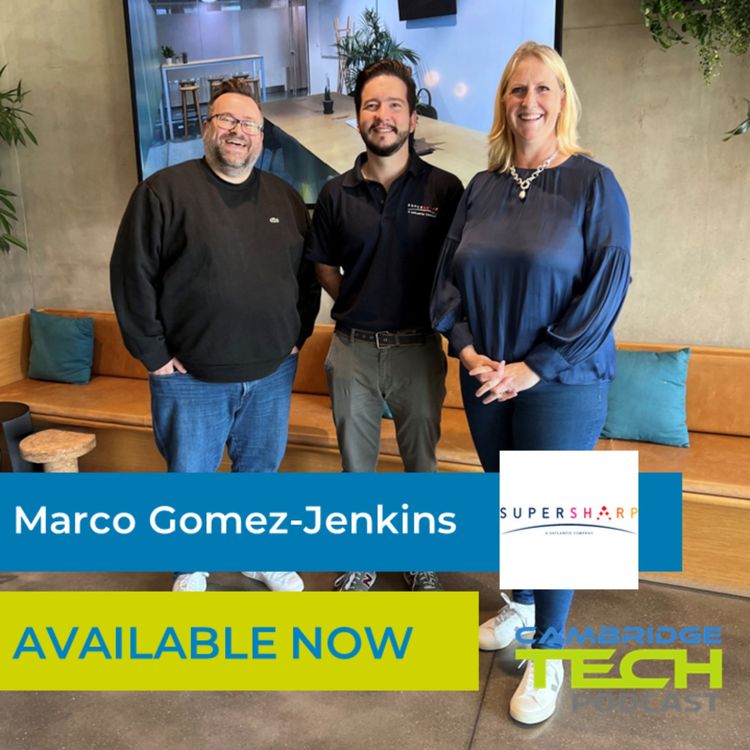
Cambridge Tech Podcast
Launching in space with Marco Gomes-Jenkins, SuperSharp
From a degree in the Netherlands to the first satellite launch in Costa Rica in 2018, to the UK to launch a space company, we talk to Marco Gomes-Jenkins, Co-Founder and CEO of Super-Sharp Space Systems Ltd.
Marco talks about his background, going to MBA at Imperial to learn ‘business’, which led him to Professor Ian Parry at Uni of Cambridge who together with George Hawker became co-founders of SuperSharp.
SuperSharp is an Earth-imaging company developing unfolding space telescopes to capture high-resolution thermal infrared (TIR) images of the Earth.
These images can be used for applications such as tackling climate change, crop monitoring, and maintaining global security, allowing high-quality affordable Earth-imaging solutions to empower the world in responding to global change.
With a space launch mid-2026, SuperSharp will have had just over 15 years of R&D funded by the UK Space Agency, Innovate UK, the European Space Agency, the UK Ministry of Defence Accelerator, plus equity investment from Cambridge Enterprise, and some individual angel investors.
Tune in to find out more about the SuperSharp journey and how the Cambridge ecosystem has helped at all stages of its growth.
Produced by Cambridge TV
More episodes
View all episodes
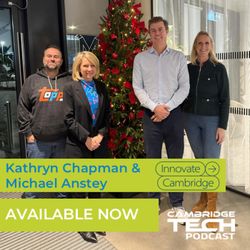
170. Unpacking 2025 and looking ahead to what's next, with Innovate Cambridge
34:02||Season 4, Ep. 170This week’s episode features a rapid-fire yet insightful interview with Kathryn Chapman and Michael Anstey from Innovate Cambridge.“It’s been a really good year for Cambridge. There’s a huge amount of momentum, inclusive innovation, and people really getting behind the agenda.”Here are the key takeaways A more united Cambridge tech clusterInnovate Cambridge has helped align the ecosystem around a clear, collective visionOne voice into government is paying off, with £400m secured for ecosystem infrastructureStrong buy-in across academia, founders, VCs and industryAI is accelerating fast, while early-stage life sciences face tougher conditions, but the depth of local support continues to be a differentiatorScaling ambition through partnership and inclusionCambridge’s strength is not just density, but collaboration beyond the cityGrowing partnerships with Manchester and Oxford to unlock talent and investmentA strong focus on inclusive innovation, from schools through to scaleupsA push to raise ambition: less talk of unicorns, more focus on building decacornsWhat’s top of the agenda for the year aheadActivating the Cambridge–Manchester partnership in a meaningful wayMaking innovation careers accessible to local talent through work with schools and councilsAttracting more global R&D leaders to the regionBacking founders to build, scale and exit globallyQuick facts from the conversationCambridge now ranks 37th globally for tech cities (Savills)£60m raised for quantum networking, a new sector recordInclusive innovation and growth capital remain front and centreA call to tell the Cambridge story better on the world stage, spotlighting companies like TRIM and Cusp AI“We need more company creation, more exits, more global syndicates.”Produced by Cambridge TV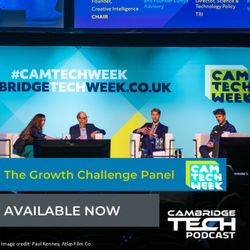
169. The Growth Challenge: How to Scale Responsibly
47:13||Season 4, Ep. 169In another of our exclusive recording from Cambridge Tech Week we hear from leading experts as they explore the frameworks, policies, and innovations shaping the ethical expansion of AI.As leaders race to integrate AI, ensuring safety, ethics, and trust is more critical than ever. How can we scale AI responsibly while mitigating risks, avoiding bias, and maintaining transparency? The expert panel includes Emilie van der Lande (Creative Intelligence), Daniel Quirke (Wayve), Dr Jakob Mokander (Tony Blair Institute) and Ray Eitel-Porter (Lumyz Advisory).Key takeaways- Cambridge is setting new benchmarks for innovation and investment in AI, biotech, and space tech. - Scaling responsibly means embedding AI governance, risk assessment, and inclusion at every level. - The debate on regulation favours targeted, industry-led frameworks - Mobility and AI are merging - promise and complexity will require cooperation between startups, regulators, and the public. - The tech community should focus on people, not just software: “Stop thinking about tech as tech; think about the human risks.”Produced by Cambridge TV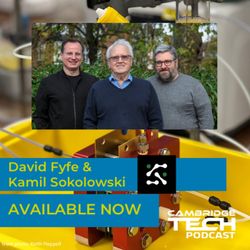
168. Kodiaq Technologies: The Future of Grid-Scale Energy Storage
57:15||Season 4, Ep. 168This week on Cambridge Tech Podcast, we sit down with David Fyfe and Kamil Sokolowski from Kodiaq Technologies for a conversation that left us excited about the future of energy storage.Key insightsMetal-Free, Organic Electrolytes: Kodiaq is developing next-gen organic electrolytes for flow batteries, avoiding the supply chain risks and costs tied to traditional metals like vanadium.Enhanced Energy Density: They had already demonstrated that the energy their electrolyte could absorb was twice that of existing vanadium technology.Drop-In Replacement: Their solution can potentially retrofit existing vanadium battery systems, instantly increasing capacity without a total system overhaul.Resilience & Simplicity: Unlike current technologies that need strict air-free conditions, Kodiaq’s electrolyte is “oxygen-tolerant” -making construction, operation, and maintenance more flexible and less expensive.Sustainability & Sovereignty: Kamil notes, "Developing this chemistry removes the dependence on the mining sector. These electrolytes can be produced anywhere and recycled for a second life."Licensing-Led Approach: Inspired by models like ARM, Kodiaq plans to supply the chemistry and intellectual property, leaving battery manufacturing and integration to partners.Global Impact, Local Roots: With worldwide ambitions, they’re actively building collaborations - especially seeking corporate partners ready to pilot their tech.As renewables explode worldwide, storing energy safely, efficiently, and scalably is the central challenge of our net-zero future. Kodiaq could be the company to crack this problem - right from Cambridge’s legendary cluster.Produced by Cambridge TV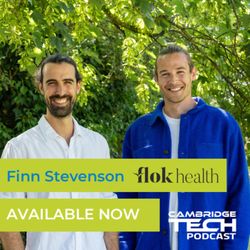
167. Finn Stevenson & Flok Health's Disruptive Digital Physiotherapy
51:44||Season 4, Ep. 167This week’s episode is a deep-dive interview with Finn Stevenson, cofounder and CEO of Flok Health, who brings a unique combination of medical expertise, startup experience, and relentless ambition to solve one of healthcare’s biggest headaches: scalable, accessible physiotherapy.Key Takeaways:Drawing on his experiences as an Olympic-level rower and healthtech professional, Finn noticed a gap: “For most people, access to high-quality, frequent physio is nearly impossible.” Enter Flok: an AI-powered physiotherapist offering on-demand, regulation-compliant digital care.Rather than building another SaaS product, Flok became a licensed healthcare provider. “We are a CQC-approved provider, treating NHS patients directly using our technology and clinicians.” This makes procurement smoother and delivers real outcomes for both patients and the NHS.Flok’s approach shuns off-the-shelf LLMs in favour of a domain-specific language for clinical reasoning, ensuring safe, explainable decision-making at every step. The system combines real-time video assembly (with a real physiotherapist, Kirsty, as the face of the AI) and robust guardrails against clinical risk.The results speak for themselves: 68% of patients offered Flok’s service choose it over traditional care, covering ages 18 to 75, and less than 2% need traditional escalation. “Positive patient feedback is central. If people aren’t happy, we don’t have a business.”Investment Ready: Raised £3.2M pre-product, pre-team. Investors love the addressable market: 80% of healthcare spend is on the delivery of services, not just tools.Built in Cambridge: Access to deep tech talent, regulatory expertise, and Europe’s largest bio campus makes Cambridge a “no-brainer” HQ.Actively Hiring: From engineering to clinical and commercial roles - Flok is scaling rapidly and innovating across new therapy areas.Produced by Cambridge TV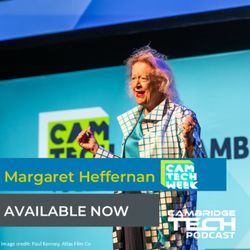
166. Margaret Heffernan live from Cambridge Tech Week
32:18||Season 4, Ep. 166This week’s episode features Dr. Margaret Heffernan’s powerful keynote from Cambridge Tech Week, giving a call to arms for anyone building or funding the next wave of innovation. She challenges the tech sector to resist “the rhetoric of inevitability” surrounding AI.Key Takeaways:On the myth of inevitability in AI:“What we’re hearing is a kind of ugly, aggressive language of inevitability. AI is coming, it’s going to do what it’s going to do. If you don’t like it, get out of the way.”The real cost to creators:“What we’re seeing right now in AI is the greatest level of industrial ID destruction in human history… Artists’ work is all being scraped so that it can feed large language models.”Copy, consent, and credit:Dr. Heffernan highlights the necessity of strong copyright for artists to keep their livelihood, identity, and voice. Without it, “no income, no reputation, no control, no consent, no identity.”The tech sector must act like grown-ups:“We’re not an infantile adolescent industry anymore… we now have choices in front of us that we have to take with some kind of adult responsibility.”Opportunity, not inevitability:The big prompt: Use technology to strengthen copyright protections and ensure creators are part of the value chain.Produced by Cambridge TV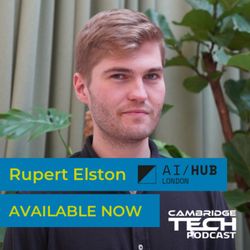
165. Inside the new London AI Hub with Rupert Elston
39:09||Season 4, Ep. 165We’re joined by Rupert Elston, who shares his journey from Oxford to leading the London AI Hub - a new centre driving collaboration across the UK’s fast-growing AI startup scene.Rupert explains how London’s 3,000+ AI startups were once scattered across disconnected clusters:“That fragmentation was stopping the UK from really leading the charge in AI.”The London AI Hub is changing that. It’s now a go-to space for founders, policymakers, and researchers to meet, collaborate, and shape the future of UK AI.In just eight months:40 events hosted and 3,000 participants engaged15 resident startups across healthtech, SaaS, wearables, and more9 of 12 startups expanded their teams, and 5 secured funding roundsCross-sector collaboration is sparking fresh ideas and new partnershipsLooking ahead:The Hub isn’t staying local. Rupert shares plans to connect with hubs across the UK - from Glasgow to Manchester - and to record and share events nationwide. There’s also active engagement with government through policy roundtables giving founders a direct voice in shaping AI regulation.“It’s about putting founders and regulators in the same room and letting them be heard.”What’s next?Expect another 5–10 startups joining the Hub, new themed event series (like investor demo days and sessions on AI in decarbonisation), and better ways to keep the community in the loop.Produced by Cambridge TV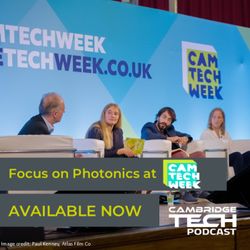
164. Bright Lights and Big Ideas: Photonics at Cambridge Tech Week
33:30||Season 4, Ep. 164In the second of our exclusive recordings from Cambridge Tech Week 2025, we turn the spotlight on photonics - a sector critical to the future of compute, AI, quantum, and more.Hosted by Dr Andy Sellars of Cornerstone, the expert panel features Elizabeth Patterson (Seagate Technology), Dr Gwen Wyatt-Moon (Prospectral), Dr Josh Silverstone (Hartley Ultrafast), Mark Rushworth (Finchetto Ltd), and Matthew Anderson (Wave Photonics), sharing insights on how the UK is building global strength in this critical field.Key takeaways:Silicon photonics is hitting its stride. After years of promise, it’s now mature enough for large-scale deployment, opening up new opportunities for data centre performance and bandwidth through wafer-scale integration.Photonics at the heart of AI and data storage. Seagate’s Mosaic 4 Plus drive, using photonic HAMR technology, already stores 30TB with ambitions to exceed 100TB.A quantum leap. Photonics will be central to scaling different modalities of quantum computers, serving as the critical interface for next-generation systems.Why the UK, why now? The UK is carving out a niche in photonics that doesn’t depend on leading-edge foundries. With its strengths in packaging technology, materials science, rapid prototyping, and strong university partnerships, manufacturing here is realistic - especially with facilities like Cornerstone in Southampton.Room for growth. The ecosystem from idea to prototype is world-class, though challenges remain in scaling production and keeping skilled talent local.💡 Keynote spotlight Professor Andrew Fitzgibbon opened the session with a thought-provoking talk that connected technology and humanity. His message: innovation should serve core human needs - food, health, and shelter - so that we can spend the rest of our time creating art and exploring what makes us human. It was a powerful reminder of the “why” behind all this progress.Produced by Cambridge TV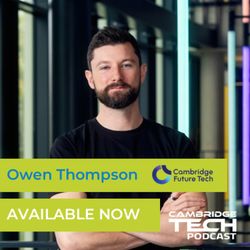
163. Building the Next Wave of Deep Tech Ventures with Owen Thompson, Cambridge Future Tech
48:50||Season 4, Ep. 163Owen Thompson, CEO and Founder of Cambridge Future Tech (CFT), returns to the podcast for a fast-paced, candid conversation on how CFT has evolved from an an ambitious venture builder to one of the UK’s most active deep tech venture studios.💡HighlightsCFT is now creating 8–10 companies a year, having just incorporated its 17th and on track to hit 20 by year-end. The team takes a hands-on approach to IP scouting, spinning out from both universities and corporate R&D labs.From the future of compute and quantum technologies to cooling systems and energy optimisation, CFT’s portfolio covers some of the most advanced sectors shaping UK innovation. With partnerships spanning 25+ universities - from Glasgow to Southampton - the studio’s reach is truly national.CFT builds “mini ecosystems” around each startup, often bringing in experienced industry leaders as CEOs. As Owen puts it, “We’ve learned we’re not just a tech company - we’re a people company.”The studio is expanding into investment with a new sister fund, Future Tech VC, launching soon marking a shift from simply building ventures to backing them through later stages.🚀 Looking AheadCFT is tackling the ongoing challenge of fundraising in 2025 head-on, engaging family offices and developing tailored capital strategies. With initiatives like the Mansion House Act and British Business Bank signalling progress, the team sees major opportunities ahead—especially in dual-use defence tech, the next quantum wave, and sustainability innovation.Tune in for an honest look at what it takes to build deep tech companies in today’s UK landscape - and why, as Owen says, “It’s all about the quality of relationships you’re building.”Produced by Cambridge TV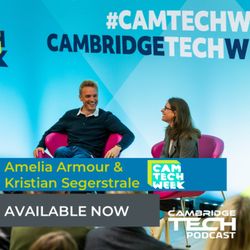
162. Cambridge Tech Week - Amelia Armour & Kristian Segerstrale
26:20||Season 4, Ep. 162We have been given permission by the Cambridge Tech Week team to share content from the conference over the coming weeks and months. Today we begin with one of our favourite sessions from startup to scaleup day, where Amelia Armour of Amadeus Capital Partners interviewed Kristian Segerstrale from Super Evil Mega Corp who is currently navigating the Cambridge ecosystem on a quest to understand how to better enable the scaleup potential of the city.Key Takeaways:• “Momentum is currency.” In the US, rapid scaling matters more than capital itself. Christian urges UK founders to foster impatience for growth and not fear fast failure.• “Everyone celebrates either a quick victory or a quick blowout. What people fear most are ‘zombie companies’ that just linger.”• Talent is the differentiator: “Don’t settle for the top 10%. Get the top 0.1%. Two best hires can be worth more than £100m in funding.”• Focus, focus, focus: “Find your win condition and do nothing else. Avoid shiny distractions- if you win, it’s because you doubled down.”• The UK has caught up: “You don’t have to move to the US anymore. Capital, talent, and mindset exist here if you assemble the right team.”• Integrating atoms and bits: “The next 5-10 years belong to startups that bridge digital and physical worlds - think robotics, batteries, sensors, and AI - something Cambridge excels at.”• Learn by doing: “There are no books. You only learn by scaling, making mistakes, and then helping the next wave go bigger.”Produced by Cambridge TV